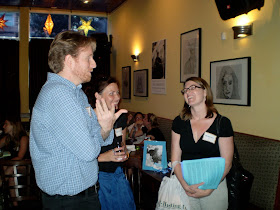In a brightly lit Tostan building in the lush, southern region of Kolda, Senegal, regional staff and 16 supervisors gathered to welcome us, a convoy of Tostan volunteers based in the big city of Dakar. The Volunteer Coordinator Zoe Williams, her assistant Cassandra Scarpino, and I, the International Communications Assistant, took a whirlwind trip to each region in Senegal in order to meet the staff in the Tostan offices located in the towns of Ourossogui, Ndjoum, Tambacounda, Kolda, Kaolack, and Mbour. Our aim was to present information on the volunteer program and on the strides we have recently made in using social media tools – such as Facebook, Twitter, YouTube, and the blog - to share Tostan’s work with a wider audience. Supervisors, who are themselves Senegalese and who often work in their home regions, spend the majority of their time in villages overseeing the implementation of the Community Empowerment Program (CEP). It was thrilling to meet them and to discuss the happenings at the Tostan International office in Dakar as well as the work being done in communities across Senegal. Below are just a few photos from our journey.
Tostan volunteers pose with Tostan staff at the regional office in Ourossogui, located in northern Senegal.
Tostan volunteers pose with Tostan staff at the regional office in Ourossogui, located in northern Senegal.
Volunteers and staff, including 16 supervisors, gather to discuss the volunteer program at the office in Kolda, located in southern Senegal.
Photos by Cassandra Scarpino








